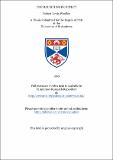The Bauschinger effect
Abstract
If a work-hardenable metal is deformed plastically by a tensile stress +σ₀ and unloaded, its mechanical properties become anisotropic; in particular, though its tensile yield stress is now +σ₀, it will deform plastically if compression stresses numerically smaller than σ₀ are applied. This is known as the Bauschinger effect (Bauschinger 1886).
When this research was commenced, very few experiments had previously been carried out to elucidate the effect as a function of the several possible variables and there was practically no satisfactory theory, except perhaps that of Masing (1923), which in any case could be severely criticised on purely theoretical grounds. It was clear that various classes of metals would probably show different types of effect. In particular the metals with face-centred and body-centred cubic lattices which deform by slip only, should show a very different effect from that exhibited by the metals of hexagonal lattice, where twinning plays an important part in the deformation. Single crystals might well show a different effect from polycrystals. In nominally pure metals the effect might well depend on grain size, elastic anisotropy, amount of previous work-hardening, temperature, purity, magnetic properties, degree of preferred orientation of a polycrystal, and orientation of a single crystal. In alloys the situation might be even more complex, especially if more than one phase were present.
For the purposes of this present research it was decided to examine the effect thoroughly and systematically in polycrystalline metals deforming entirely by slip, and to carry out exploratory experiments on other metals and in other conditions, including in particular, polycrystalline hexagonal metals and single crystals. Studies of macroscopic mechanical properties alone are not usually very conclusive in establishing the mechanism of the physical processes occurring, and it seemed very desirable to obtain additional information by examining the accompanying changes of other physical properties. Some experiments on these lines are discussed in sections III and V. The exploratory experiments of sections III, V, VI and VIII were deliberately restricted usually to one metal under well-defined conditions, in view of limitations of time. It is hoped to extend these experiments in the near future.
Type
Thesis, PhD Doctor of Philosophy
Collections
Items in the St Andrews Research Repository are protected by copyright, with all rights reserved, unless otherwise indicated.

